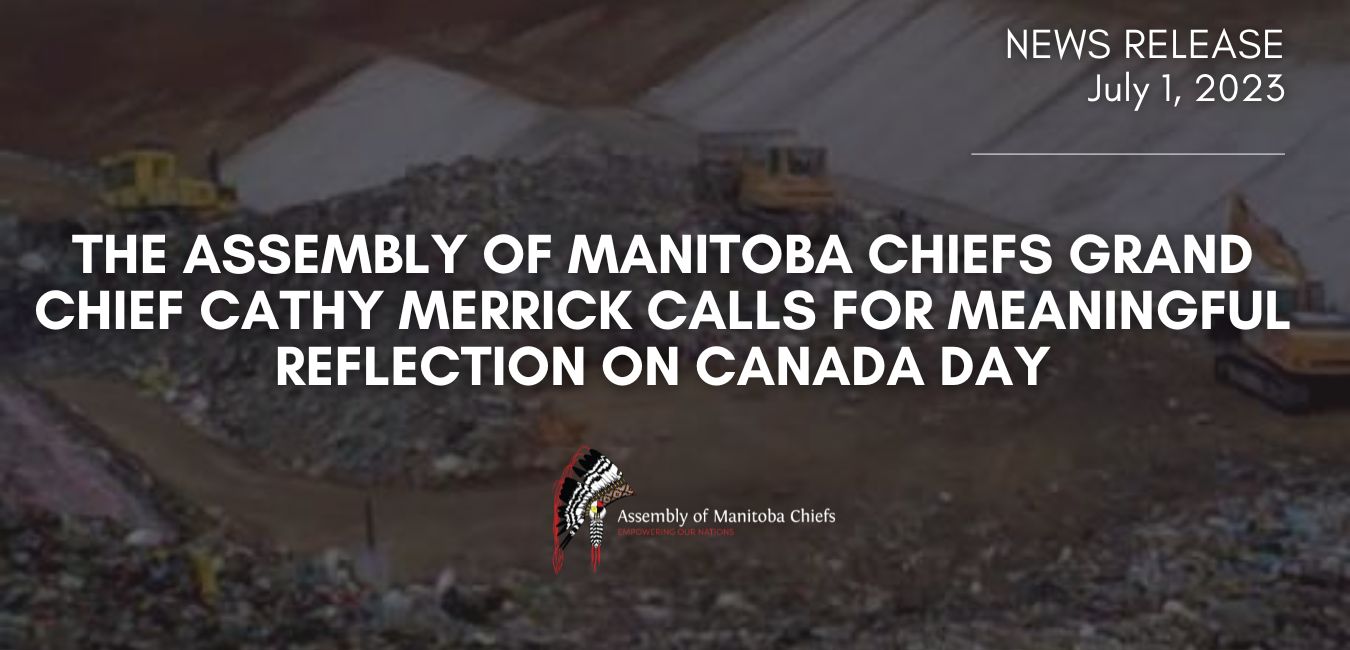The Assembly of Manitoba Chiefs Grand Chief Cathy Merrick Calls for Meaningful Reflection on Canada Day

July 1, 2023
Treaty One Territory, Manitoba
AMC Communications
Treaty One Territory, Manitoba – Today, on this Canada Day, I call upon every Canadian to deeply reflect on the relationship between Canada and the First Nations Peoples who have been stewards of this land since time immemorial. Canada’s formation 156 years ago marked a significant turning point in our ancestral lands. The arrival of European settlers initiated a complex and often painful chapter in our history, leading to the displacement, dispossession, and marginalization of First Nations Peoples. While Canada’s birth represents a nation-building process for some, for First Nations, it signifies a profound disruption that continues to shape our ongoing struggle for recognition, justice, and self-determination. It is time for us to confront the urgent and pressing issues that continue to burden our communities, perpetuating injustices that have echoed across generations.
First and foremost, we must address the devastating epidemic of missing and murdered Indigenous women, girls, and two-spirit individuals (MMIWG2S+). This crisis has inflicted profound pain and loss on our communities, leaving countless families shattered and seeking justice. We must confront the systemic issues that contribute to this violence, such as racism, sexism, and the devaluation of First Nations lives. It is crucial that we implement comprehensive measures to ensure the safety and protection of MMIWG2S+, while also holding perpetrators accountable. Healing and justice can only be achieved when we acknowledge and address this grave injustice that continues to haunt our Nation. Together, let us work tirelessly to bring an end to this epidemic and create a society where every First Nations citizen can live free from the fear of violence and exploitation.
Additionally, we must acknowledge the deplorable conditions that persist within many First Nations. Despite being surrounded by the abundance and prosperity of Turtle Island, far too many First Nations endure conditions reminiscent of third-world countries. This stark reality directly violates the Treaties that represent our shared values of equality and fairness. We cannot continue letting Canada’s governments ignore this glaring disparity. It is our collective duty to work nation-to-nation, ensuring that the basic human rights of all citizens are upheld and that the conditions in First Nations reflect the inherent dignity and respect that every individual in this country deserves.
Furthermore, the recent rise in residential school deniers underscores the urgent need for greater education and awareness about the true history of Canada’s treatment of First Nations Peoples. The legacy of residential schools casts a dark shadow upon Canada’s history, and denial only perpetuates the wounds inflicted upon Survivors and their descendants. We must confront this painful truth with empathy and a genuine commitment to truth and reconciliation. We must actively implement the Truth and Reconciliation Commission’s 94 Calls to Action, fostering an environment where healing and understanding can flourish.
The overrepresentation of First Nations children in Canada’s child welfare system is yet another critical issue that demands our attention. The separation of our families through discriminatory practices has caused immeasurable harm, perpetuating cycles of trauma and fracturing the bonds that hold our communities together. We must work collaboratively to overhaul the child welfare system, placing cultural sensitivity, community involvement, empowerment, and preserving family unity at its core. Only then can we ensure that our children are afforded the opportunity to grow up in nurturing and supportive environments that celebrate their unique identities.
Lastly, the overrepresentation of our people within prisons speaks to the systemic barriers that obstruct the success and well-being of First Nations. We must confront the underlying factors contributing to this disproportionate reality, including poverty, limited access to quality education and healthcare, and the intergenerational trauma that continues to haunt us. It is through collective action addressing these root causes that we can forge a society grounded in justice, equality, and the inherent rights of every individual.
As Canadians, we hold within us the power to shape a future that is rooted in justice, reconciliation, and equity. Let us seize this moment and stand in unwavering solidarity, embracing our shared responsibility to build a Canada that fully recognizes and respects the rights and dignity of First Nations Peoples. Together, we can bring about meaningful change, creating a society that reflects the values of our shared Treaties, understanding, and true reconciliation.
-30-
For more information, please contact:
Communications Team
Assembly of Manitoba Chiefs
Email: media@manitobachiefs.com
About the Assembly of Manitoba Chiefs
The AMC was formed in 1988 by the Chiefs in Manitoba to advocate on issues that commonly affect First Nations in Manitoba. AMC is an authorized representative of 62 of the 63 First Nations in Manitoba with a total of more than 151,000 First Nation citizens in the province, accounting for approximately 12 percent of the provincial population. AMC represents a diversity of Anishinaabe (Ojibway), Nehetho / Ininew (Cree), Anishininew (Ojibwe-Cree), Denesuline (Dene) and Dakota Oyate (Dakota) people.